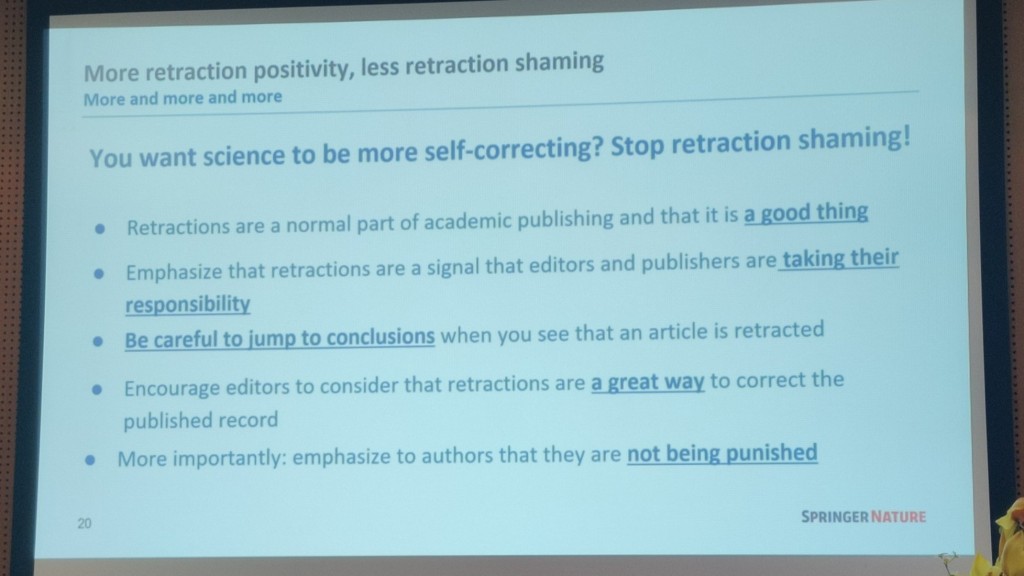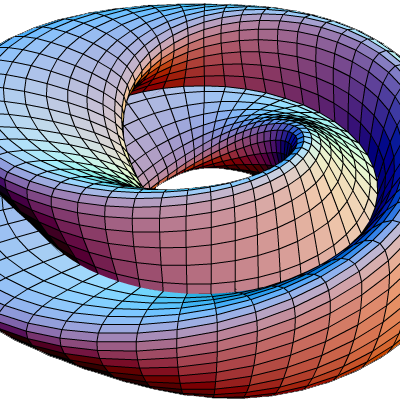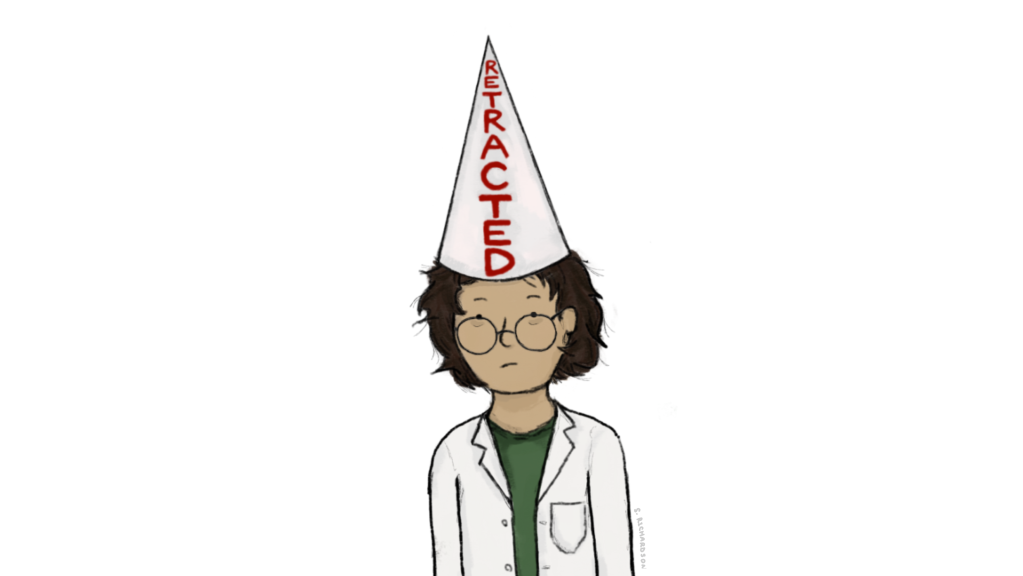Header image by Sydney Richardson.
On June 5, head of Research Integrity and Resolutions at Springer Nature Tim Kersjes presented “Requiem for the Retraction: why proposals for ‘honest retractions’ fail in their objective to promote and encourage the self-correction of science” at the 2024 World Conference on Research Integrity (WCRI).
Included was the following slide, later shared by Maria Zalm, senior editor and team manager of Publication Ethics at PLOS:

More retraction positivity, less retraction shaming
More and more and more and more
You want science to be more self-correcting? Stop retraction shaming!
Retractions are normal part of academic publishing and that is a good thing
Emphasize that retractions are a signal that editors and publishers are taking their responsibility
Be careful to jump to conclusions when you see that an article is retracted
Encourage editors to consider that retractions are a great way to correct the published record
More importantly: emphasize to authors that they are not being punished
Reactions followed. Pseudonymous sleuth Morty said:
If this is the final conclusion from #WCRI2024, so help us God. Most of the retractions is due to research misconduct. We need more shaming of scientists who commit research misconduct!
Reproducibility researcher and science writer James Heathers said:
I was just thinking about ‘stop retraction-shaming’ today. While reading a 15 month old email thread pleading with an editor to retract clearly falsified medical papers.
Sleuth and founder of the 5GH Foundation WU Guangheng said:
We do NOT agree. Honest errors have a very small number, but hundreds of thousands of misconduct cases are waiting publishers to handle. Both PLoS and Springer Nature should take more effort to “clean up” their history, and [quickly respond] to new cases.
Maria Zalm responded:
To clarify, [Tim Kersjes] and I are not suggesting that fraudulent research should not be retracted, but rather that unreliable articles should be retracted REGARDLESS of misconduct findings.
…
[If] we are truly serious about correcting the scientific literature, we need to encourage people to retract their own erroneous/unrepeatable results, and this won’t happen as long as there is such a huge [stigma] around all retractions.
Other have written at length about the stigma surrounding retractions:
- Ending the retraction stigma: Encouraging the reporting of errors in the biomedical record
- Breaking the stigma of retraction
- Retraction Stigma and its Communication via Retraction Notices
In my own research and in discussions with others, I have encountered compelling arguments both for why retraction should be more stigmatized and why retraction should be less stigmatized. I have yet to form a coherent opinion myself. Here, I wanted to collect and discuss these arguments to aid my own understanding and invite arguments from others.
We should first frame this debate in terms of a common value: the essentiality of retractions. Most observers will agree that retractions are an indispensable part of the scientific process and that it is a good thing when an unreliable paper is retracted. Most observers will agree that even though retraction is becoming increasingly frequent, not enough papers are retracted and retractions often take far too long. One might argue that retraction is not an essential part of science publishing (see “Science is a strong-link problem” by psychologist Adam Mastroianni), but we need to stick to one framework by which we can judge our arguments. Thus, we should prefer a position that improves the efficiency and integrity of retraction as a research publishing practice.
Position A: Retractions should be more stigmatized
Contention A1: Most retractions are due to misconduct and misconduct should be shameful
Observers agree that most retractions are the result of research misconduct on the part of one or more authors (Fang et al., Freijedo-Farinas et al., Grieneisen and Zhang). Many retractions are now the result of particularly egregious forms of misconduct like paper milling or other systematic research fraud. Research misconduct should not be tolerated. As such, instances of misconduct should be met with scorn for the sake of punitive and preventive justice.
There is some evidence that retraction shaming, as an attitudinal implementation of preventive justice, would work as a deterrent against research misconduct. Chen et al. report that lower perceived consequences were positively associated with self-reporting of research misconduct in a large sample of Chinese physicians. Martinson et al. suggest that scientists’ perceptions of organizational injustice may also contribute to misconduct.
Contention A2: Shameless repeat offenders will continue their careers
Researchers that have published retracted work can and do lose their jobs and access to funding, even without official findings of misconduct from their employers. However, if employers are not diligent in their background checks or simply do not care, the most ignominious offenders might be able to keep their jobs or move onto new ones and continue recklessly polluting the scientific record. I surmise that researchers that are comfortable violating ethical norms of scientific conduct would also be more likely to violate professional and personal ethical norms.
Shame should be used to prevent these individuals from continuing to climb the ranks for protection of the scientific record and possibly the protection of violators’ colleagues, students and patients. An official finding of misconduct will most likely not appear in a Google search of a quack doctor’s name. A tweet will.
Contention A3: Shame is all we have
Retractions happen very infrequently; there were about 10,000 published retractions to about 10,000,000 published peer-reviewed articles in 2023 (a 1:1,000 ratio). Many retracted articles are not prominently labelled as retracted by the publisher despite COPE guidelines. Lots of retracted articles will continue to be cited as if they were not retracted (see Hsiao and Schneider). Moreover, retracted articles are still counted towards bibliometrics like h-index and citation count in most databases. Beyond retraction, individual sanctions are exceedingly infrequent. For instance, the US Department of Health and Human Services Office of Research Integrity sanctions on the order of 10 individuals every year, often fewer. University investigations often close without official misconduct findings even as retractions mount.
If these formal measures are woefully insufficient for addressing research misconduct, we should practice shame as a low-cost and scalable alternative.
Position B: Retractions should be less stigmatized
Contention B1: Retraction stigma could prevent self-reported retractions
In most cases, authors will be those that most completely understand the content of their scientific work. Thus, authors are among the best-prepared to spot errors in their work and move to correct or retract. A heavy stigma and career penalty associated with retractions, real or perceived, could discourage authors from retracting their own work. This might explain why so few retractions are associated with honest error, as mentioned in Contention A1.
In 2020, Chemistry Nobel laureate Frances Arnold retracted a 2019 Science article she authored, noting:
For my first work-related tweet of 2020, I am totally bummed to announce that we have retracted last year’s paper on enzymatic synthesis of beta-lactams. The work has not been reproducible.
It is painful to admit, but important to do so. I apologize to all. I was a bit busy when this was submitted, and did not do my job well.
Many commentators (rightfully, in my opinion) celebrated Arnold’s transparency and proactiveness. Early-career researchers without a Nobel prize or a well-earned reputation might be more reluctant to follow this path exactly because of the perceived personal cost.
Contention B2: Retraction stigma impedes the retraction process
Authors will often mount vicious defenses against criticisms and investigations of their work that could end in retraction. The perception that a retraction will bring public and personal shame will undoubtedly fuel this behavior. The threat of shame can prompt authors to launch lawsuits, spout vitriol or not cooperate with investigations by journals and employers, tying up proceedings and delaying retractions for years. James Heathers is not alone in his 15-month quest to get a paper retracted—experienced sleuths will have endured innumerable prolonged matches of back-and-forth with editors and authors. Fear of getting tangled up in these matches will also discourage observers from reporting errors in the first place.
Editors will be similarly disincentivized against initiating investigations and executing retractions by the perception of shame. No editor would want the name of their journal besmirched by calling attention to a problematic paper with a retraction. Similarly, editors will want to maintain professional relationships with prestigious researchers. This is hard to do if the editor is perceived as an agent of a humiliating witch hunt.
Contention B3: Shame can be misdirected
Retraction notices rarely assign blame for mistakes or misconduct. Many retraction notices are cartoonishly opaque (e.g. “[the] article…has been voluntarily retracted by the authors due to a ‘non-scientific reason’”). As a result, it is very difficult for readers to properly evaluate where shame should be directed or if it should be employed at all. Obscurant practices by institutional committees charged with investigating misconduct compound this difficulty. In this fog, there is always a strong possibility that the innocent will be targeted for shaming and the guilty will escape ire.
Junior researchers are already the most likely to shoulder the brunt of retraction’s consequences. Jin et al. found that citation losses to prior works by an author following a retraction of their work are far less severe for eminent authors. The citation penalty on prior work (previously described by the same team) also implies that other, unimpeachable work by a group of authors will earn fewer citations following the retraction of one of their otherwise unrelated articles. In essence, shame might cause us to disregard valuable work.
How much collateral damage should the scientific community tolerate in the name of punishing misdeeds?
Contention B4: There is not enough shame to go around
Attention spans are limited. Cultural memory can be short. Even the most tireless cranks must eventually stop ringing the alarm. There are undoubtedly tens of thousands of scientific fraudsters out there who deserve to lose face and never will simply because shame is rate-limited.
In our cultural context, this also means that the most shame will be reserved for the most scandalous cases. Hence, headlines will abound for one AI-generated rat penis but a case of more than 50 medical studies with faked authorship will get comparatively little attention. If we aim the weapon of shame selectively and illogically, we should hesitate to wield it.
Position C: We are asking the wrong question
The more practically-minded among us will note that we are debating attitudinal solutions to what is clearly a structural problem.
Not only do these solutions have duller teeth than sweeping systemic changes, but no one has the authority to force a cultural change in how something is stigmatized. As retractions become more frequent, it is also difficult to predict how that stigma might change on its own. We should direct our effort towards reshaping scientific institutions for organizational justice instead of litigating how scientists should feel about science integrity measures.
What are your thoughts?
Feel free to share your thoughts and arguments for or against retraction shaming in the comments on this post. As retractions grow exponentially, discussions like these will shape the future of scientific publishing and may alter the character of ‘self-correction’ as a scientific maxim.


Leave a comment